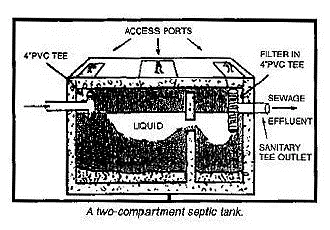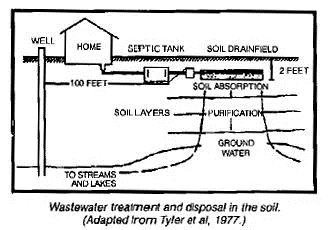All About Septic Tanks
What is a septic tank system?
A septic tank system consists of two components:
1) The tank is an underground water-tight container, almost always constructed of concrete, and is built to receive sewage and retain the liquid portion for approximately 24 hours. The tank has three functions: First, it acts as a settling chamber to allow solids to settle to the tank bottom; second, the tank serves as a digestion chamber to allow biological treatment, and third, the tank becomes a storage vault for solids until removed.

2) Tile absorption field (Nitrification Field) is the second and probably the most critical part of the septic tank system. It consists of a trench or system of trenches. Many alternative systems are now in place, not only gravel systems. We now have chamber systems, fire chips, and Styrofoam.

Septic Tank System Installation
To protect the public health from the dangers of improper sewage disposal practices, state regulations have been adopted. The regulations are designed to help ensure that when a septic tank system is used, it will be constructed to meet appropriate standards, of sufficient size to handle the anticipated waste load, and that the soil is suitable for absorption of sewage. These regulations require that a permit to construct a septic tank system be obtained from the county health department. A septic tank system may not be covered with earth until an inspection is made and approval is given by the county health department sanitarian.
Remember that a septic tank system cannot be safely installed on all lots or building sites. Some lots or building sites are unsuitable because of the type of soil, terrain (too steep, too low, or wet, etc.), size, ground water, rock, or other factors which should interfere with proper operation of the system. Roots of trees and shrubs growing near the system may get in the way of trenches and block the flow of sewage. It is advisable to remove growth over the trenches or near the system.
Care of Your Septic Tank System
Here are some tips for optimal usage and maintenance:
- Only household waste and toilet tissue should be disposed of in a septic tank system. Keep all kitchen greases out of the system.
- Any leaks that develop in the plumbing fixtures should be immediately corrected. A leaking faucet or toilet tank, no matter how small, will result in complete saturation and failure of the absorption field.
Periodic cleaning or pumping of accumulated solids is necessary. If the solids are allowed to build up in the tank to a point that they begin to pass out of the tank into the soil absorption network, the soil will soon become clogged with the solids, resulting in failure of the system. If this happens, costly repairs will have to be made before the system will function properly. How often you should get it cleaned depends on many factors- the only sure way to determine the need for service is to inspect it periodically. We recommend you have your septic tank pumped out every 3-5 years, with a yearly inspection to avoid any problems.
Autos and other heavy items should not sit over the system. This causes excessive compaction and structural damage. You may be able to get a sketch of your system from the county health department to locate all parts, helpful in case of problems or when you get it cleaned.
No presently known chemical, yeast, bacteria, enzyme, or other additive product will improve the operation or life expectancy of a septic tank system.
Call us today with any questions or to schedule a consultation.







